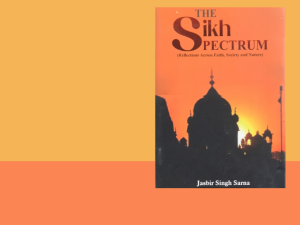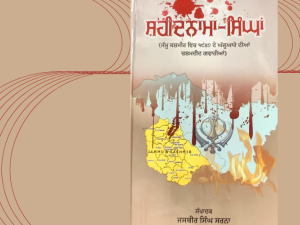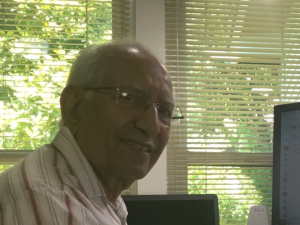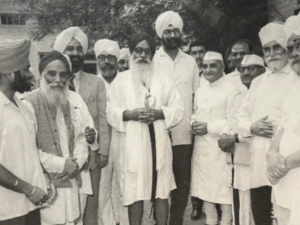Hatred. Anger. Urge to Revenge. Despair. Pain. All of these emotions surface when something deeply traumatic is done to us or to those with whom we share a connection. Yet the Sikh Ardaas (prayer) is always for Sarbat Da Bhalaa. Goodwill to all people.
Goodwill to all. It is a noble sentiment. But is it realistic to have goodwill towards every single person, especially in the face of social illnesses such as racism, sexual violence, religious hatred or physical persecution?
Anger, grief, pain – these emotions surface naturally when we experience some kind of injury or trauma. Does Sarbat Da Bhalaa mean to not have those feelings? Do we pretend they don’t exist or stuff them away to maintain appearances?
The teachings of the Sikh Gurus can often be misunderstood. When we get hurt, anger and pain are the emotions that inform us we are hurt. These feelings act as messengers, carrying vital information. Ignoring these emotions has the effect of blocking our ability to respond to the situation. This inability to feel our feelings and react to the information in an advantageous way causes us to live our lives in a state of emotional immobility.
But the Sikh Gurus offer us a method to feel the emotions and process them within a spiritual framework where the emotions can move and be transformed. We can acknowledge uncomfortable emotions within ourselves, such as anger, shame or grief; and then shift our consciousness to a vaster perspective. From that broader framework, the emotions release and resolve into peace. This creates emotional health and maturity.
The teachings of the Sikh Gurus provide a sophisticated system to acknowledge and process our emotions within a spiritual framework that leads to emotional freedom and maturity. This framework does not deny the heavy emotions. Rather, it encourages us to find a place within ourselves where these challenging feelings can move through us. We discover the capacity to let go of animosity. To maintain compassion for ourselves and for others. And in the most egregious of circumstances, to experience Nirbhao, Nirvair – a state of divinely consciousness beyond both fear and vengeance.
This capacity to stay compassionately engaged even with those who have done harm to us is called, in Gurmukhi, Khimaa ਖਿਮਾ.
Khimaa ਖਿਮਾ sometimes gets translated as forgiveness. But when we look to the roots of what forgiveness means; and we look at the spiritual framework the Sikh Gurus taught – khimaa ਖਿਮਾ is quite unique and the English term “forgiveness” does not quite do it justice. It is worth exploring what this difference looks like.
Before discussing khimaa ਖਿਮਾ, first let us reference the teaching that it is possible to view both friend and enemy as equivalent to one another. What does that mean?
Guru Arjan Dev ji describes the formula in the following shabad:
ਭੈਰਉ ਮਹਲਾ ੫ ॥
Bhairo Mehalaa 5 ||
Bhairao, Fifth Mehl:
ਪ੍ਰਥਮੇ ਛੋਡੀ ਪਰਾਈ ਨਿੰਦਾ ॥
Prathhamae Shhoddee Paraaee Nindhaa ||
First, I gave up slandering others.
ਉਤਰਿ ਗਈ ਸਭ ਮਨ ਕੀ ਚਿੰਦਾ ॥
Outhar Gee Sabh Man Kee Chindhaa ||
All the anxiety of my mind was dispelled.
ਲੋਭੁ ਮੋਹੁ ਸਭੁ ਕੀਨੋ ਦੂਰਿ ॥
Lobh Mohu Sabh Keeno Dhoor ||
Greed and attachment were banished entirely.
ਪਰਮ ਬੈਸਨੋ ਪ੍ਰਭ ਪੇਖਿ ਹਜੂਰਿ ॥੧॥
Param Baisano Prabh Paekh Hajoor ||1||
I see God ever-present, close at hand; I have become a great devotee. ||1||
ਐਸੋ ਤਿਆਗੀ ਵਿਰਲਾ ਕੋਇ ॥
Aiso Thiaagee Viralaa Koe ||
Such a renunciate is very rare.
ਹਰਿ ਹਰਿ ਨਾਮੁ ਜਪੈ ਜਨੁ ਸੋਇ ॥੧॥ ਰਹਾਉ ॥
Har Har Naam Japai Jan Soe ||1|| Rehaao ||
Such a humble servant chants the Name of the Divine, Har, Har. ||1||Pause and Reflect||
ਅਹੰਬੁਧਿ ਕਾ ਛੋਡਿਆ ਸੰਗੁ ॥
Ahanbudhh Kaa Shhoddiaa Sang ||
I have forsaken my egotistical intellect.
ਕਾਮ ਕ੍ਰੋਧ ਕਾ ਉਤਰਿਆ ਰੰਗੁ ॥
Kaam Krodhh Kaa Outhariaa Rang ||
The hue of sensual desire and anger has vanished.
ਨਾਮ ਧਿਆਏ ਹਰਿ ਹਰਿ ਹਰੇ ॥
Naam Dhhiaaeae Har Har Harae ||
I meditate on the Naam, the Name of the Divine, Har, Har.
ਸਾਧ ਜਨਾ ਕੈ ਸੰਗਿ ਨਿਸਤਰੇ ॥੨॥
Saadhh Janaa Kai Sang Nisatharae ||2||
In the Company of the Holy, I am emancipated. ||2||
ਬੈਰੀ ਮੀਤ ਹੋਏ ਸੰਮਾਨ ॥
Bairee Meeth Hoeae Sanmaan ||
Enemy and friends have become the same to me.
ਸਰਬ ਮਹਿ ਪੂਰਨ ਭਗਵਾਨ ॥
Sarab Mehi Pooran Bhagavaan ||
The Perfect Divine is permeating all.
ਪ੍ਰਭ ਕੀ ਆਗਿਆ ਮਾਨਿ ਸੁਖੁ ਪਾਇਆ ॥
Prabh Kee Aagiaa Maan Sukh Paaeiaa ||
Accepting the Will of the Divine, I have found peace.
ਗੁਰਿ ਪੂਰੈ ਹਰਿ ਨਾਮੁ ਦ੍ਰਿੜਾਇਆ ॥੩॥
Gur Poorai Har Naam Dhrirraaeiaa ||3||
The Perfect Guru has implanted the Name of the Divine within me. ||3||
ਕਰਿ ਕਿਰਪਾ ਜਿਸੁ ਰਾਖੈ ਆਪਿ ॥
Kar Kirapaa Jis Raakhai Aap ||
That person, whom the Divine, in His Mercy, saves
ਸੋਈ ਭਗਤੁ ਜਪੈ ਨਾਮ ਜਾਪ ॥
Soee Bhagath Japai Naam Jaap ||
That devotee recites and goes deeper into the Naam.
ਮਨਿ ਪ੍ਰਗਾਸੁ ਗੁਰ ਤੇ ਮਤਿ ਲਈ ॥
Man Pragaas Gur Thae Math Lee ||
That person who obtains understanding through the Guru’s vision,
his/her mind becomes illumined.
ਕਹੁ ਨਾਨਕ ਤਾ ਕੀ ਪੂਰੀ ਪਈ ॥੪॥੨੭॥੪੦॥
Kahu Naanak Thaa Kee Pooree Pee ||4||27||40||
– says Nanak, that person is totally fulfilled. ||4||27||40||
This Shabad, hymn, is so very rich. Yet the one facet that struck us the deepest is the first line about slandering others. The Guru instructs that when we stop slandering others, the mind leaves behind anxiety, greed and attachment. It is fascinating to us to learn that peace begins with our own decision to stop speaking or thinking negatively about other people. That by not slandering them, the anxiety in our minds disappears.
When we experience trauma, fear or pain, the instinct to lash out, to blame someone, shame someone, rage against someone, speak negatively about someone is a very normal way of life. Yet in this Shabad, the Guru suggests that speaking negatively about others keeps the mind in a state of dis-ease. And that making a choice to not think or say anything negative brings the mind to ease.
When we curb our predisposition to speak negatively, it gives the ability for our sight to soften and widen. To “see the Perfect One permeating all.” If we choose to not speak negatively, and we choose to see the Divine in every heart – then it follows quite naturally what the Guru says. That “enemy and friends have become the same to me.”
In other words, it does not matter whether a person is an enemy or a friend. My mind responds with the same emotional equanimity to both.
Accessing this state of consciousness is a tall order, no doubt. How can we cultivate the habit of not speaking negatively about others? Rather than just biting our tongue, how do we genuinely come to the state of not having anything negative to say?
I think this Shabad by Guru Naanak Dev ji gives us a clue. It illustrates the point by quoting an event detailed in the ancient Hindu history.
ਪ੍ਰਭਾਤੀ ਮਹਲਾ ੧ ਦਖਣੀ ॥ SGGS, p. 1344
Prabhaathee Mehalaa 1 Dhakhanee ||
Prabhaatee, First Mehl, Dakhnee:
ਗੋਤਮੁ ਤਪਾ ਅਹਿਲਿਆ ਇਸਤ੍ਰੀ ਤਿਸੁ ਦੇਖਿ ਇੰਦ੍ਰੁ ਲੁਭਾਇਆ
Gotham Thapaa Ahiliaa Eisathree This Dhaekh Eindhra Lubhaaeiaa ||
Ahalyaa was the wife of Gautam, the seer. Seeing her, Indra was enticed.
ਸਹਸ ਸਰੀਰ ਚਿਹਨ ਭਗ ਹੂਏ ਤਾ ਮਨਿ ਪਛੋਤਾਇਆ ॥
Sehas Sareer Chihan Bhag Hooeae Thaa Man Pashhothaaeiaa ||1||
When he received a thousand marks of disgrace on his body,
then he felt regret in his mind. ||1||
ਕੋਈ ਜਾਣਿ ਨ ਭੂਲੈ ਭਾਈ
Koee Jaan N Bhoolai Bhaaee ||
O Siblings of Destiny, rarely anyone knowingly makes mistakes.
ਸੋ ਭੂਲੈ ਜਿਸੁ ਆਪਿ ਭੁਲਾਏ ਬੂਝੈ ਜਿਸੈ ਬੁਝਾਈ ॥੧॥ ਰਹਾਉ
So Bhoolai Jis Aap Bhulaaeae Boojhai Jisai Bujhaaee ||1|| Rehaao ||
He alone is mistaken, whom the Divine Herself makes so. He alone understands,
whom the Divine causes to understand. ||1||Pause and Reflect||
ਤਿਨਿ ਹਰੀਚੰਦਿ ਪ੍ਰਿਥਮੀ ਪਤਿ ਰਾਜੈ ਕਾਗਦਿ ਕੀਮ ਨ ਪਾਈ
Thin Haree Chandh Prithhamee Path Raajai Kaagadh Keem N Paaee ||
Harichand, the king, and ruler of his land did not appreciate
the value of his pre-ordained destiny.
ਅਉਗਣੁ ਜਾਣੈ ਤ ਪੁੰਨ ਕਰੇ ਕਿਉ ਕਿਉ ਨੇਖਾਸਿ ਬਿਕਾਈ ॥੨
Aougan Jaanai Th Punn Karae Kio Kio Naekhaas Bikaaee ||2||
If he had known that it was a mistake, he would not have made such a show
of giving in charity, and he would not have been sold in the market. ||2||
ਕਰਉ ਅਢਾਈ ਧਰਤੀ ਮਾਂਗੀ ਬਾਵਨ ਰੂਪਿ ਬਹਾਨੈ
Karo Adtaaee Dhharathee Maangee Baavan Roop Behaanai ||
The Divine took the form of a dwarf, and asked for some land.
ਕਿਉ ਪਇਆਲਿ ਜਾਇ ਕਿਉ ਛਲੀਐ ਜੇ ਬਲਿ ਰੂਪੁ ਪਛਾਨੈ ॥੩
Kio Paeiaal Jaae Kio Shhaleeai Jae Bal Roop Pashhaanai ||3||
If Bal the king had recognized Him, he would not have been deceived
and sent to the underworld. ||3||
ਰਾਜਾ ਜਨਮੇਜਾ ਦੇ ਮਤਂੀ ਬਰਜਿ ਬਿਆਸਿ ਪੜ੍ਹ੍ਹਾਇਆ
Raajaa Janamaejaa Dhae Mathanaee Baraj Biaas Parrhaaeiaa ||
Vyaas taught and warned the king Janmayjaa not to do three things.
ਤਿਨਿ ਕਰਿ ਜਗ ਅਠਾਰਹ ਘਾਏ ਕਿਰਤੁ ਨ ਚਲੈ ਚਲਾਇਆ ॥੪
Thinih Kar Jag Athaareh Ghaaeae Kirath N Chalai Chalaaeiaa ||4||
But he performed the sacred feast and killed eighteen Brahmins;
the record of one’s past deeds cannot be erased. ||4||
ਗਣਤ ਨ ਗਣਂੀ ਹੁਕਮੁ ਪਛਾਣਾ ਬੋਲੀ ਭਾਇ ਸੁਭਾਈ
Ganath N Gananaee Hukam Pashhaanaa Bolee Bhaae Subhaaee ||
I do not try to calculate the account; I accept the Hukam of the Divine’s Command.
I speak with intuitive love and respect all.
ਜੋ ਕਿਛੁ ਵਰਤੈ ਤੁਧੈ ਸਲਾਹਂੀ ਸਭ ਤੇਰੀ ਵਡਿਆਈ ॥੫
Jo Kishh Varathai Thudhhai Salaahanaee Sabh Thaeree Vaddiaaee ||5||
No matter what happens, I will praise the Divine.
It is all Your Glorious Greatness, O Divine One. ||5||
ਗੁਰਮੁਖਿ ਅਲਿਪਤੁ ਲੇਪੁ ਕਦੇ ਨ ਲਾਗੈ ਸਦਾ ਰਹੈ ਸਰਣਾਈ
Gurmukh Alipath Laep Kadhae N Laagai Sadhaa Rehai Saranaaee ||
The Guru Oriented Gurmukh remains detached; filth never attaches itself to such person.
This individual remains forever in God’s Sanctuary.
ਮਨਮੁਖੁ ਮੁਗਧੁ ਆਗੈ ਚੇਤੈ ਨਾਹੀ ਦੁਖਿ ਲਾਗੈ ਪਛੁਤਾਈ ॥੬
Manamukh Mugadhh Aagai Chaethai Naahee Dhukh Laagai Pashhuthaaee ||6||
The foolish self-willed manmukh does not think of the future;
that is overtaken by pain, and then regrets. ||6||
ਆਪੇ ਕਰੇ ਕਰਾਏ ਕਰਤਾ ਜਿਨਿ ਏਹ ਰਚਨਾ ਰਚੀਐ
Aapae Karae Karaaeae Karathaa Jin Eaeh Rachanaa Racheeai ||
The Creator who created this creation acts, and causes all to act.
ਹਰਿ ਅਭਿਮਾਨੁ ਨ ਜਾਈ ਜੀਅਹੁ ਅਭਿਮਾਨੇ ਪੈ ਪਚੀਐ ॥੭
Har Abhimaan N Jaaee Jeeahu Abhimaanae Pai Pacheeai ||7||
O Divine One, our egotistical pride does not depart from the soul.
Falling into egotistical pride, we are ruined. ||7||
ਭੁਲਣ ਵਿਚਿ ਕੀਆ ਸਭੁ ਕੋਈ ਕਰਤਾ ਆਪਿ ਨ ਭੁਲੈ
Bhulan Vich Keeaa Sabh Koee Karathaa Aap N Bhulai ||
Everyone makes mistakes; only the Creator does not make mistakes.
ਨਾਨਕ ਸਚਿ ਨਾਮਿ ਨਿਸਤਾਰਾ ਕੋ ਗੁਰਪਰਸਾਦਿ ਅਘੁਲੈ ॥੮॥੪
Naanak Sach Naam Nisathaaraa Ko Gur Parasaadh Aghulai ||8||4||
Says Nanak, salvation comes through the True Name.
By Guru’s Gift, one is released. ||8||4||
The compassion in this Shabad (hymn) is so powerful. And this compassion has its roots in a non-dualistic perception of life.
“…no one knowingly makes a mistake….That one alone is mistaken whom the Divine makes so….The Creator acts and causes all to act….Everyone makes mistakes; only the Creator does not make mistakes….I do not try to calculate the account; I accept the Hukam of the Divine’s Command. I speak with intuitive love and respect all….
No matter what happens, I will praise the Divine. It is all Your Glorious Greatness”
The lines from this Shabad convey the essence of non-dualistic compassion. That “I” have no power to compute the account. That the Divine is the Doer of everything. That whatever happens, happens in Hukam – in alignment with the Cosmic Play. That nobody chooses to make a mistake. Though we all do make mistakes.
This Shabad gives us very powerful, though challenging, psycho-spiritual medicine. To help us swallow this medicine, the Guru pulls examples from great myths and stories. King Janmayjaa, King Bal, Indra. It is not so much about whether these stories are literally true or not. What matters is the Guru saying – even Kings and Gods get deceived. Even they have no power to avoid mistakes. Focus your mind on the Doer of All and do not try to figure out why things happen, because Hukam is beyond our human capacity to compute.
Just keep appreciating. Just keep singing, in positive ways. Do not let the mind go into slander.
It is said that Guru Hargobind went on a friendly hunting trip with Emperor Jahangir only a few months after the torture and death of his father, Guru Arjan Dev ji, by the Emperor’s order. Similarly, Guru Gobind Singh ji presented a special Robe of Honor to Bahadur Shah when he succeeded the throne of his father, the Mogul King, Auragzeb. Even though Aurangzeb had caused the martyrdom of Guru Gobind Singh ji’s father and mother, his four children and countless Sikhs.
This is very difficult to accept and understand if we look at the event through every-day eyes. Yet, the Guru’s life stories exemplify the virtue of khimaa ਖਿਮਾ that was inculcated in the Sikh way of life. Guru Hargobind and Guru Gobind Singh had fully realized the truth embodied within the Shabad Guru. They had the character, courage and ability to look upon friends and enemies alike. They beheld everything that happened as Hukam, as part of the Divine Plan. This gave them the strength to stay positive in speech and action, to harbor no anxiety in their minds.
Khimaa ਖਿਮਾ is a very refined, emotionally mature and spiritually elevated point of view of Gurmat, the Guru’s pathway. The capacity to be kind and positive, from the non-dualistic heart of compassion, even to the person who tortured your Beloved family to death.
The following passage from a Shabad by Guru Naanak, on page 1013 of the Guru Granth, uses the word Khimaa ਖਿਮਾ. And the context that surrounds it has the qualities that we have been discussing.
ਸੋ ਸੰਨਿਆਸੀ ਜੋ ਸਤਿਗੁਰ ਸੇਵੈ ਵਿਚਹੁ ਆਪੁ ਗਵਾਏ ॥
So Sanniaasee Jo Sathigur Saevai Vichahu Aap Gavaaeae ||
That person alone is a Sannyasi, who serves the True Guru,
and removes self-conceit from within.
ਛਾਦਨ ਭੋਜਨ ਕੀ ਆਸ ਨ ਕਰਈ ਅਚਿੰਤੁ ਮਿਲੈ ਸੋ ਪਾਏ ॥
Shhaadhan Bhojan Kee Aas N Karee Achinth Milai So Paaeae ||
That person does not ask for clothes or food; without asking,
they accept whatever they receive.
ਬਕੈ ਨ ਬੋਲੈ ਖਿਮਾ ਧਨੁ ਸੰਗ੍ਰਹੈ ਤਾਮਸੁ ਨਾਮਿ ਜਲਾਏ ॥
Bakai N Bolai Khimaa Dhhan Sangrehai Thaamas Naam Jalaaeae ||
That person does not speak empty words; but gathers the wealth
of tolerance (ਖਿਮਾ) and burns away their anger with the Naam.
ਧਨੁ ਗਿਰਹੀ ਸੰਨਿਆਸੀ ਜੋਗੀ ਜਿ ਹਰਿ ਚਰਣੀ ਚਿਤੁ ਲਾਏ ॥੭॥
Dhhan Girehee Sanniaasee Jogee J Har Charanee Chith Laaeae ||7||
Blessed is such a householder, Sannyasi and Yogi,
who focuses their consciousness on the Divine’s feet. ||7||
Accepting what is given. Not speaking pointlessly with ill will. The wealth of Khimaa ਖਿਮਾ develops and with it we can burn away our anger and anxiety. Here – Khimaa ਖਿਮਾ is translated as “tolerance.” But the context of it implies a compassionate, surrendered tolerance that creates a sense of forgiveness, and a willingness to engage others with a fully open heart.
-------------------
SS Ek Ong Kaar Khalsa Michaud and Dr. Bhai Harbans Lal





